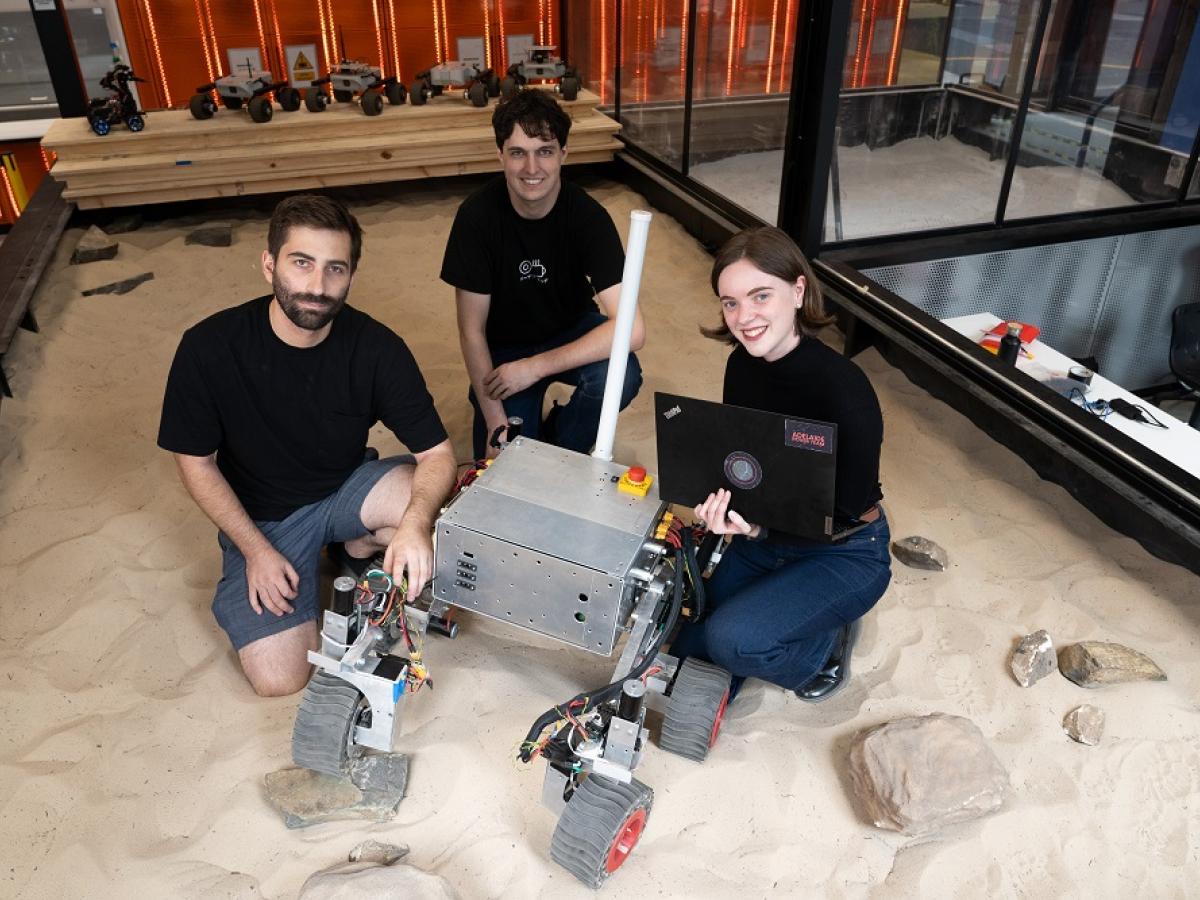Future space leaders made here: How the Australian Rover Challenge is sending next generation space explorers to the Moon
University students from around Australia and the world will converge at the University of Adelaide to pit their custom-built lunar rovers against each other in a one-of-a-kind event from 20 to 24 March, during the University’s 150th anniversary year.

(L-R) Thomas Burke (PhD student) Early solar system planetary evolution; Henry Mellor (PhD student) Bio-Inspired Autonomous Swarm Construction of Lunar Structures and Georgia Dallimore- 5th year Bachelor of Engineering (Mechanical & Aerospace) (Honours) with a Bachelor of Mathematical and Computer Sciences degree
Streamed live globally, the fourth annual Australian Rover Challenge (ARCh) will see 10 semi-autonomous lunar rovers – designed and built by different student teams – undertake a hands-on simulated mission to the Moon.
This year the ARCh will be held for the first time at the new Exterres Analogue Facility at the University’s Roseworthy campus. The facility is a world-class, multi-purpose research facility for application in the space and agriculture sectors. The rovers will be challenged to complete highly complex tasks necessary for real-life space exploration.
Teams will be scored and judged by industry experts from ARCh partners Boeing, ELO2, and the Australian Space Agency.
Aiming for the Moon
According to Associate Professor John Culton, co-founder of ARCh and Director of the Andy Thomas Centre for Space Resources, the challenge aims to inspire the next generation of Australia’s space workforce to learn by doing.
“The Australian Rover Challenge is one of the most technically demanding rover competitions in the world. Every rover will be tested against four tasks that together simulate a full real-life mission to the moon. The teams are being challenged to solve a really complex variety of lunar exploration problems,” he said.
The four tasks are: rolling off a lunar lander and accessing nearby equipment; lunar excavation and construction work; prospecting for resources buried among the lunar regolith (Moon dust); and mapping the lunar surface using only autonomous sensing and navigation.
Associate Professor Culton notes that the current cohort of students will be among the first to experience end-to-end careers in the space industry.
“The University of Adelaide has a long history of developing Australia’s competency in the space sector, and this challenge is just another way we’re nurturing the skills and expertise that will power Australia’s space industry,” he said.
“This will be the first generation of Australian university students with the opportunity to work in the civil space sector from graduation right through to retirement without having to go overseas.”
2024 Australian Rover Challenge live coverage
A clear career pathway for students
Georgia Dallimore, co-lead of the Adelaide Rover Team, is in the fifth year of a Bachelor of Engineering (Mechanical & Aerospace) (Honours) with a Bachelor of Mathematical and Computer Science degree at the University of Adelaide. She says ARCh creates a pathway for students into a career supporting space exploration.
“This Challenge provides an incredible chance to learn practical skills on a student STEM project like no other,” she said.
“For me, it has been a direct pathway from working on the simulated lunar mission in the ARCh, to now contributing to a real-life lunar mission as an aerospace engineer in my ongoing internship.”
“The ARCh has been a cornerstone of my time at the University. It’s an exciting, adrenaline-pumping week where you witness the culmination of your team’s hard work, alongside the amazing innovation from students around the world.
“Long-lasting friendships are made in a collaborative, supporting environment- something constantly championed by our Project Lead, Thomas Burke. This spirit makes the intensely complex task of building a rover a success for the team.”
Competing teams for the 2024 Australian Rover Challenge are:
| Team name | University |
|---|---|
| Adelaide Rover Team | University of Adelaide |
| Monash Nova Rover | Monash University |
| UniMelb Rover Team | University of Melbourne |
| RMIT Rover Team | Royal Melbourne Institute of Technology |
| Swinburne Rover Team | Swinburne University of Technology |
| QUT Robotics Club | Queensland University of Technology |
| UQ Space | University of Queensland |
| UOW Rover Team | University of Wollongong |
| Project Scorpio | Wrocław University of Science and Technology (Poland) |
| Team Atlas | Brac University (Bangladesh) |
Event Details
-
ARCh welcome event and EXTERRES Analogue Facility official opening
-
Date: 20 March 2024
-
Time: 3 pm
-
Location: Roseworthy campus, University of Adelaide
-
ARCh competition days
-
Date: 21-24 March 2024
-
Time: daily from 9 am to 5 pm.
-
Location: Roseworthy campus, University of Adelaide
The challenge will be livestreamed at on the ARCh webpage https://set.adelaide.edu.au/atcsr/australian-rover-challenge/
Australian Rover Challenge partners are: Boeing, ELO2, iSpace, Australian Space Agency, South Australian Space Industry Centre, Caterpillar, CSIRO and Mini Mammoth Games.
Media contact:
Suhanna Yazami, Senior Account Manager, WE Communications for University of Adelaide. Phone: 0434 749 231. Email: syazami@we-worldwide.com
Crispin Savage, Manager, Media and News, University of Adelaide. Phone: 08 8313 7194 / 0481 912 465. Email: crispin.savage@adelaide.edu.au
